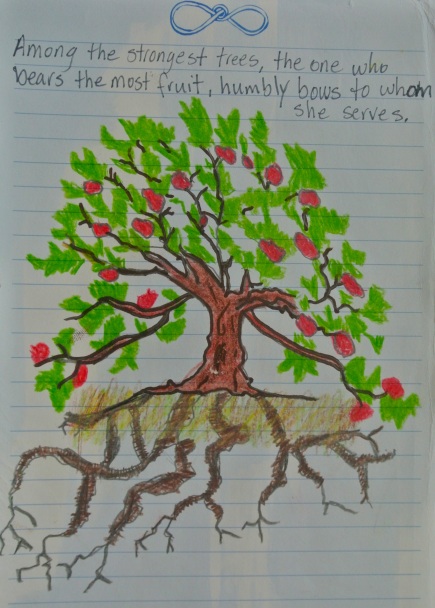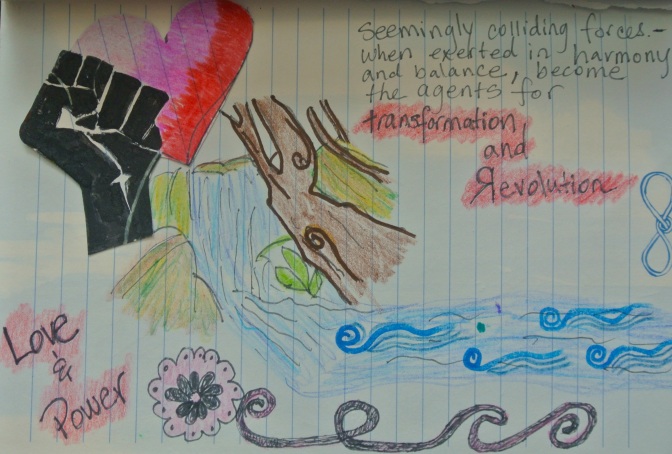“Humility is not the absence of courage or strength; it is the modesty that comes from confidence and power.” – Ochi
Our continued healing and growth is also part of developing leadership. As we take risks and navigate through new experiences, we also call upon those aspects of ourselves that are wounded and traumatized to the surface. Whenever we find ourselves in a new situation, all the parts of us that require healing rise to the surface, giving us the opportunity to reconcile the pain with the lesson we are being summoned to learn. Confronting the pain and acknowledging that as much as we are strong and accomplished, we are also fragile and flawed, is a very humbling process for the heart. As we are humbled, we are able to connect at a much deeper level with those whom we serve and have relationships with because we are not occupied with proving we are better, or worse judging others. It can be quite difficult to be humble in a society that encourages competition and individuality over collaboration and community. The more I learn to accept my limitations, the more I have come to recognize how much I need others. The community eyes, and hands, and heart are greater than that of any individual member.
“Among the strongest trees, the one who bears the most fruit, humbly bows to whom she serves” (Persian Proverb). Another way to see this is that the strongest tree produces the most fruit, hanging heavy as she gives of herself to those who come in her presence. When we stand robust, rooted deeply in the essence of who we are, we don’t have to occupy ourselves with proving how smart we are, how important we are, how qualified we are, or how worthy we are, because we already know that we are enough. The confidence to lead comes from knowing that, like the seed, we are already equipped with the knowledge to develop into a creative and transformational force. It is through the work of serving others that we demonstrate our greatness, not because we are better than, but because in uplifting others we uplift ourselves. Humility is the lens that allows us to recognize we all have a gift to share; each one of us has a function in ensuring our world is developing at its greatest capacity. When our hearts are full of pride and arrogance we are unable to see the full potential of the whole, and so we manifest our own limitations onto the work we are doing, ultimately obstructing the greatest fulfillment of ourselves. One of the largest sunflowers to be cultivated is one that measures a height of 17 feet with a 24 inch seed head. To grow sunflowers that can fulfill this type of greatness, their seeds must be sown directly into the garden rather than in a pot. Sunflowers have fast growing taproots that become stunted if confined. In this same manner, our pride and arrogance can act as the pot, confining us to a mediocre version of our true selves.
Go first when leading with vulnerability. Go last when leading with humility.
The lessons and experiences of others can be as enriching and fulfilling to our lives as our own experiences are if we are willing to listen and follow, and surrendering control is a huge aspect of that. We must be willing to be humble enough to risk making mistakes, and when we do make mistakes, we must be vulnerable enough to own our mistakes, and count on the people we work and connect with to guide us through the messiness of leadership. In Costa Rica I had the opportunity to work with many wonderful people. While there were only four official youth mentors, I saw many of the local people we worked with as mentors as well – from the chauffeurs, to the housekeeping staff, to the cooks. They were all there, everyday, whole-heartedly, engaging with the students, ensuring their safety, nurturing them, and creating a sense of home. One of the greatest reasons why I was able to successfully connect with all the students was because the support staff became my extra eyes and ears. If I was having a difficult time relating to a student, I’d ask them to help me observe the student to see if they could find a connection that I couldn’t. I’d also asked them for advice and input on how to handle various day-to-day challenges. Ultimately they became my mentors, and some of the greatest lessons I took away were thanks to the relationship and collaboration that I developed with them.
Love in its totality stands for the ability to feel compassion for others, to see what connects us rather than separates us, to make whole what has been fragmented (the drive to unity), and above all, to see the other person in us. This concept has been at the core of many indigenous societies around the world. Mayans expressed this concept of unity as they greeted each other saying, “In lak’ech,” I am another you, and, “Hala ken,” you are another me. In Philippines the word, Bayanihan, refers to the spirit of unity and cooperation. In the Southern African region, Ubuntu, represents the belief in a universal bond of sharing that connects all humanity. Desmond Tutu best describes it as, “My humanity is inextricably wrapped up in yours.” Sarvodaya is a Sanskrit term coined by Mahatma Gandhi meaning universal uplift or the progress of all in which the good of the individual is contained within the good of the whole.
At the core of our being, there is love. Love is our spiritual identity. Every experience, every encounter, every lesson learned is life’s way of training us to be a greater expression of love. However, in order to transform love from a state of being to a state of action, we must also engage with the idea of power. Power, as Paul Tillich defined it, is the drive of everything living to realize itself. So power in this sense is the drive to achieve our purpose (live our truth), to get our job done, to grow, without suppressing the self-realization of another. We need both love and power. Love is the energy that inspires the seed’s vision of what the rose shall become, and power is the focused energy and intention that turns the seed into a root, and then into a stem with leaves, ultimately fulfilling its vision.
Seemingly colliding forces, love and power, when exerted in harmony and balance, become the agents for creation, evolution, and transformation. Martin Luther King Jr. states that because love and power have usually been contrasted as opposites, “. . . love is identified with the resignation to power, and power with the denial of love.” Love is the intention to create connections and wholeness in all that we confront. Love, however, can never be used as a reason for denial, avoidance, or fear. Many times we find ourselves dimming our power in order to not disrupt order or make people uncomfortable. When we silence our voice and our truth, we engage in degenerative self-love, denying ourselves the opportunity to become fully human. Power, on the other hand, is the ability to achieve purpose, and the strength required to bring about change, whatever that change may be. However there is a destructive and abusive power, and that occurs when we become so focused on our individual accomplishments and progress that we deny the well-being and progress of others. Therefore, as we embark on a journey to realize ourselves and our deepest purpose, we must ensure that our self-expression and self-growth is working toward unification.
As I am learning to step into my true power, I am also learning to discern whether I am operating from a place of love or a place of ego (degenerative power). I was offered the position of co-director for the last session of the program. A series of events happened during the first week that absorbed me into a dynamic of colliding forces. Fortunately, I was able to recognized immediately that the emotions and thoughts that I was beginning to operate from were in response to a need to affirm my capacity and competence. When my focus started to become to prove my self-worth rather than my initial intention, to serve and love the students, I began to experience insecurity, doubt, and fear. “When two great forces collide,” says Lao Tzu, “the victory will go to the one that knows how to yield.” Love and power should work in harmony, not in resistance. Once I decided to step back into the role in which I felt most authentic, as a mentor rather than director, I was able to gain back trust in myself and my voice, for I was once again leading from the space of love. At first my initial reaction was to criticize myself for quitting and not stepping up to the challenge. But I realized that yielding means, “to surrender to relaxation, to flexibility, to the balanced state of mind and body that makes doing a job feel like dancing.” And I went to Costa Rica to dance – to be like water flowing. I went there to be a greater expression of love! This is the explanation I gave to the students, when they asked me why I had stepped back from co-directing. And it is the lesson I wanted to model for them – Love without power is like the moon without the sun, and power without love is like sun rays with unrestricted radiation.
We seem to be living with many misconceptions of what a leader is. We have handed over power without love to pseudo leaders who are more interested in their own personal success than in the transformation of the world. We have convinced ourselves that if we are not experts, if we hold no power, if we do not have an aggrandizing title, then we are not worthy of being leaders. If we do not have these rites of passage, we are expected to know our place, not to presume that we actually have something to contribute to the whole. We each have a story, and each of us must use the power of that story to improve our lives and the lives of others. We all have a role in leadership to fulfill, and that role will look different for each of us depending what our gifts and talents are. Some folks are inspirational speakers, some are effective organizers, some are great delegators, still others are strong visionaries. And no matter where our gifts and talents lie, the potential to be transformational leaders is rooted in our ability to see the whole; put ourselves in vulnerable situations in order to take risks and explore new options; humble ourselves to allow for others to participate in a shared leadership; and understand the power we hold when our drive and focus is in harmony with our truth and our connection to others.


